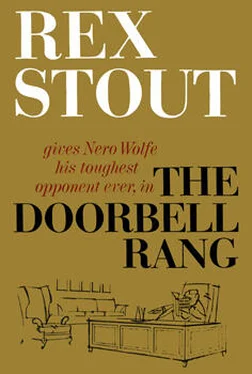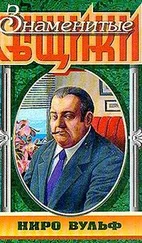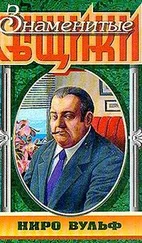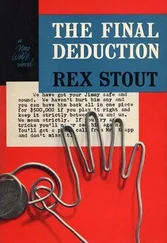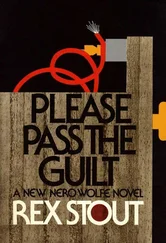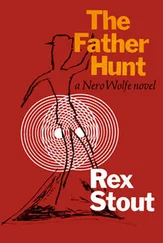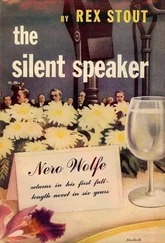From the Gazette files, and from Lon Cohen by word of mouth off the record, I had filled a dozen pages of my notebook. I have it here now, but all of it in print would also take a dozen pages, so I’ll report only what you need to understand what happened. Here are the principal names:
MORRIS ALTHAUS, deceased, 36, height 5 feet 11, weight 175, dark complexion, handsome, liked all right by men but more than liked by women. Had had a two-year affair, 1962 and 1963, with a certain stage personality, name not given here. Had earned from his writing around ten grand a year, but it had probably been augmented by his mother without his father’s knowledge. Not on record when he and Marian Hinckley had decided to tie up, but as far as known he had had no other girl friend for several months. Three hundred and eighty-four typewritten pages of an unfinished novel had been found in his apartment. No one at the Gazette , including Lon, had any firm guess who had killed him. No one there had known, before the murder, that he had been collecting material for a piece on the FBI, and Lon thought that was a disgrace to journalism in general and to the Gazette personnel in particular. Apparently Althaus had used rubber soles.
DAVID ALTHAUS, Morris’s father, around 60, was partner in Althaus and Greif, makers of the Peggy Pilgrim line of dresses and suits (see your local newspaper.) David had resented it that Morris, his only child, had given Peggy Pilgrim the go-by, and they hadn’t been close in recent years.
IVANA (Mrs. David) ALTHAUS had not seen a reporter, and would not. She was still, seven weeks after her son’s death, seeing no one but a few close friends.
MARIAN HINCKLEY, 24, had been on the research staff at Tick-Tock for about two years. There were pictures of her in the file, and they made it easy to understand why Althaus had decided to concentrate on her. She had also refused to talk to reporters, but a newshen from the Post had finally got enough out of her for a spread, making some fur fly at the Gazette . It had made one Gazette female so sore that she worked up the theory that Marian Hinckley had shot Althaus with his own gun because he was cheating on her, but it had petered out.
TIMOTHY QUAYLE, around 40, was a senior editor at Tick-Tock . I include him because he had got rough and tangled with a journalist from the Daily News who tried to corner Marian Hinckley in the lobby of the Tick-Tock building. A man that gallant deserves a look.
VINCENT YARMACK, around 50, was another senior editor at Tick-Tock . I include him because the piece by Althaus about the FBI had been his project.
It didn’t look very promising for an approach. I considered the stage personality, but her whirl with Althaus had ended more than a year ago, and besides, a couple of previous experiences had taught me that actresses are better from the fifth or sixth row. The two editors would hang up. Father probably had nothing. Marian Hinckley would stiff-neck me. The best bet was mother, and it was her number I looked up and went to the booth to dial.
First, of course, to get her to the phone. To the female who answered I gave no name; I merely told her, in an official tone, to tell Mrs. Althaus that I was talking from a booth and an FBI man was with me and I must speak to her. It worked. In a couple of minutes another voice came.
“Who is this? An FBI man?”
“Mrs. Althaus?”
“Yes.”
“My name is Archie Goodwin. I’m not an FBI man. I work for Nero Wolfe, the private investigator. The FBI man is not here in the booth with me; he is with me because he is following me. Tailing me. He will follow me to your address, but that doesn’t matter to me if it doesn’t to you. I must see you — now if possible. It will—”
“I am not seeing anybody.”
“I know. You may have heard of Nero Wolfe. Have you?”
“Yes.”
“He has been told by a man he knows well that your son Morris was killed by an agent of the FBI. That’s why I am being followed. And that’s why I must see you. I can be there in ten minutes. Did you get my name? Archie Goodwin.”
Silence. Finally: “You know who killed my son?”
“Not his name. I don’t know anything. I only know what Mr. Wolfe has been told. That’s all I can say on the phone. If I may make a suggestion, we think Miss Marian Hinckley should know about this too. Perhaps you could phone her and ask her to come, and I can tell both of you. Could you?”
“I could, yes. Are you a newspaper reporter? Is this a trick?”
“No. If I were this would be pretty dumb, you’d only have me bounced. I’m Archie Goodwin.”
“But I don’t...” Long pause. “Very well. The hallman will ask you for identification.”
I told her of course, and hung up before she could change her mind.
When leaving the house I had decided that I would completely ignore the tail question, but I couldn’t help it if my eyes, while scouting the street for an empty taxi, took notice of standing vehicles. However, when I was in and rolling, up Madison Avenue and then Park, I kept facing front. To hell with the rear.
It was a regulation Park Avenue hive in the Eighties — marquee, doorman hopping out when the taxi stopped, rubber runner saving the rug in the lobby — but it was Grade A, because the doorman did not double as hallman. When I showed the hallman, who was expecting me, my private investigator license he gave it a good look, handed it back, and told me 10B, and I went to the elevator. On the tenth floor I was admitted by a uniformed female who took my hat and coat, put them in a closet, and conducted me through an arch into a room even bigger than Lily Rowan’s where twenty couples can dance. I have a test for people with rooms that big — not the rugs or the furniture or the drapes, but the pictures on the walls. If I can tell what they are, okay. If all I can do is guess, look out; these people will bear watching. That room passed the test fine. I was looking at a canvas showing three girls sitting on the grass under a tree when footsteps came and I turned. She approached. She didn’t offer a hand, but she said in a low, soft voice, “Mr. Goodwin? I’m Ivana Althaus,” and moved to a chair.
Even without the picture test I would have passed her — her small slender figure with its honest angles, her hair with its honest gray, her eyes with their honest doubt. As I turned a chair to sit facing her I decided to be as honest as possible. She was saying that Miss Hinckley would come soon, but she would prefer not to wait. She had understood me to say on the phone that her son had been killed by an agent of the FBI. Was that correct?
Her eyes were straight at me, and I met them. “Not strictly,” I told her. “I said that someone told Mr. Wolfe that. I should explain about Mr. Wolfe. He is — uh — eccentric, and he has certain strong feelings about the New York Police Department. He resents their attitude toward him and his work, and he thinks they interfere too much. He reads the newspapers, and especially news about murders, and a couple of weeks ago he got the idea that the police and the District Attorney were letting go on the murder of your son, and when he learned that your son had been collecting material for an article about the FBI he suspected that the letting go might be deliberate. If so, it might be a chance to give the police a black eye, and nothing would please him better.”
Her eyes were staying straight at me, hardly a blink. “So,” I said, “we had no case on our hands, and he started some inquiries. One thing we learned, a fact that hasn’t been published, was that nothing about the FBI, no notes or documents, was found by the police in your son’s apartment. Perhaps you knew that.”
Читать дальше
